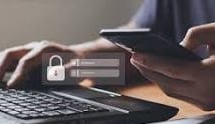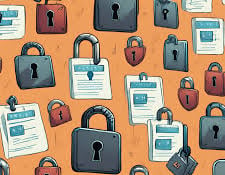Introduction
Imagine walking into your favorite coffee shop. You wouldn’t let just anyone into the back office, would you? Similarly, in the world of cybersecurity, authentication ensures that only the right individuals can access sensitive information and systems. Whether it’s your personal email or your company’s data infrastructure, the process of verifying "Are you who you say you are?" is essential to preventing unauthorized access.
Abstract
Overview
Authentication serves as the gatekeeper to everything digital. From logging into websites to accessing company resources, it’s the first thing standing between your data and cybercriminals. With evolving threats and increasingly sophisticated attackers, strong authentication methods are crucial to ensuring your business stays protected.
Authentication is the first line of defense in cybersecurity, acting as the digital gatekeeper to your sensitive data and systems. In this blog, we’ll break down the importance of authentication and explore the best practices that every cybersecurity professional should follow to safeguard their organization’s digital assets.


[Disclaimer: This blog post is for informational purposes only and should not be construed as legal or financial advice. Organizations should consult with legal counsel and regulatory authorities to ensure compliance with reporting requirements.]
Mandatory
For any cybersecurity strategy, implementing robust authentication mechanisms is non-negotiable. It’s a foundational element of your security posture and a must-have for ensuring that sensitive data is only accessed by authorized individuals.
Applicability
This applies to every organization—whether you're a small business or a global enterprise. As your digital footprint grows, so does the need to secure access points to your networks, applications, and sensitive information.
Regulatory or Company Interest?
With regulations like GDPR and HIPAA mandating strong security measures, implementing secure authentication methods isn't just a good idea—it’s legally required. Authentication is at the heart of compliance with many cybersecurity frameworks.
Key Guidelines
Use Multi-Factor Authentication (MFA) to add an extra layer of security.
Implement role-based access controls (RBAC) to ensure users only access what they need.
Regularly update and rotate passwords.


Key Implications
Failure to implement secure authentication practices can expose your organization to cyberattacks, data breaches, and potential regulatory penalties. Strong authentication is essential to maintaining the integrity of your systems.
Countries with Adoption or Influence
Countries across the globe, from the EU (GDPR) to the United States (HIPAA), have recognized the importance of authentication in their cybersecurity frameworks. As a result, secure authentication is becoming a global standard.
International Frameworks Influenced
International frameworks such as ISO 27001 and NIST Cybersecurity Framework emphasize the importance of authentication as a critical control for data protection.
Regional and Industry-Specific Frameworks
Industries like healthcare (HIPAA) and finance (PCI-DSS) have strict requirements for user authentication, with additional guidelines for sensitive data access.
Conclusion
Authentication is the digital equivalent of a security guard. Whether it's passwords, MFA, or biometrics, ensuring robust authentication systems is key to protecting your business and customer data.
Secure Your Digital Identity with SecureKnots
Contact us to learn more about our cybersecurity services and ensure your organization meets cybersecurity requirements.


How secureknots can Help?
At SecureKnots, we provide comprehensive GRC consulting, security audits and certifications, and VAPT testing to help ensure your authentication systems are robust and compliant. Our security awareness training and phishing simulations can help employees recognize potential threats, ensuring they don’t fall victim to authentication-based attacks. SecureKnots is your partner in fortifying your organization’s digital gatekeeper.
Thank you for your attention! If you have any inquiries about cybersecurity requirements or need expert guidance, please don't hesitate to contact SecureKnots.
This should wrap up the blog and fulfill the promise made in the previous one!
Authentication Matters-The Digital Gatekeeper
Imagine your favorite coffee shop. You don’t want just anyone wandering into the staff room or accessing the cash register, right? Similarly, in the digital realm, authentication ensures that only the right people get access to the right information at the right time.
From logging into your email to accessing your company’s internal system, authentication is the gatekeeper that verifies, "Are you who you claim to be?"
WITH OUR SHORT BLOGS
STAY UP TO DATE
Copy Rights @ 2023 SecureKnots. All Rights Reserved.
CONTACT US
Contact@Secureknots.com
USA
+1-302-601-2346
+1-302-608-6708
INDIA
080-31658865
GET IN TOUCH
